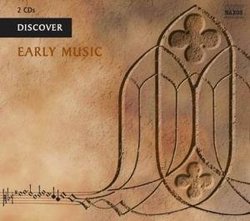| All Artists: Ambrosian Chant, Gregorian Chant, Hildegard von Bingen, 11th century French Polyphony Anonymous, Christmas Traditional, Alfonso X (el Sabio), Carmina Burana Anonymous, Guiraut Riquier, Guillaume Dufay, Francesco Landini, John Dunstable, Johannes Ockeghem, Antoine Busnois, Josquin Desprez, Clement Janequin, Tylman Susato, John Taverner, Christopher Tye, Thomas [Composer] Tallis, William [Composer] Byrd Title: Discover Early Music Members Wishing: 0 Total Copies: 0 Label: Naxos Original Release Date: 1/1/2005 Re-Release Date: 11/1/2005 Genres: Dance & Electronic, Special Interest, Classical Styles: Instructional, Opera & Classical Vocal, Chamber Music, Forms & Genres, Rondos, Historical Periods, Early Music, Renaissance (c.1450-1600) Number of Discs: 2 SwapaCD Credits: 2 UPC: 636943817025 |
Search - Ambrosian Chant, Gregorian Chant, Hildegard von Bingen :: Discover Early Music
 | Ambrosian Chant, Gregorian Chant, Hildegard von Bingen Discover Early Music Genres: Dance & Electronic, Special Interest, Classical
|
Larger Image |
CD Details |
CD ReviewsGood idea in theory, but... Maddy Evil | London, UK | 09/13/2007 (3 out of 5 stars) "For anyone hoping to discover new types of music, compilation CDs offer an accessible overview from which they can pursue areas which interest them. The project is always a daunting task - how should one go about it and what should be included? Inevitably, the selection of chosen material is determined by the record company's existing catalogue; thus the resulting CD says more about them (here Naxos) than the repertoire itself (here early music). Nevertheless, 'Discover Early Music' is a laudable attempt, attractively packaged and supplemented with a readable booklet. However, there are some real anomalies here... 1. Why is Guillaume de Machaut (c.1300-77), the most important figure of the Ars Nova, unrepresented? Why is the Italian Renaissance madrigal absent? (see below *1). This is all the more difficult to explain given the existence in the Naxos catalogue of exemplary recordings of both of these (see below *2)!! 2. The ordering of material is somewhat illogical - the carol "Gaudete" (c.1582 - here given the evasive attribution "traditional") is followed by a cantiga from Alfonso X of Castile's collection (compiled 1250-80), Dufay (c.1398-1453) is followed by Landini (c.1325-97), Dowland (1563-1626) is followed by Isaac (c.1450-1517)... 3. To illustrate the observation that modern performances of the same piece can vary in ensemble and interpretation, the CD presents Josquin's "El Grillo" (CD1 tracks 15 + 16) and Landini's "Non avra ma'pieta questa mia donna" (CD1 tracks 10 + 11) (p.34), but this is misleading: they come from contrasting versions in separate manuscripts from different decades! The one example here which actually substantiates this point is, oddly enouugh, overlooked (Susato's Gaillarde I, CD1 tracks 19 + 20). In short, the idea behind the compilation is praiseworthy, but not entirely successful; the more extensive 'century series' by Harmonia Mundi (albeit at a higher price) is more convincing. *1 The closest included examples - Josquin's "El Grillo" (CD1 tracks 15 + 16) and Lassus' "Lagrime di San Pietro: I. Il magnanimo Pietro" (CD2 track 12) - being a frottola and spiritual madrigal respectively. *2 Machaut: La Messe de Nostre Dame; Songs from Le Voir Dit, Oxford Camerata/Jeremy Summerly (Naxos 8.553833) and Monteverdi Madrigals Book I (1587), Delitiae Musicae/Marco Longhini (Naxos 8.555307)" Awesome value -- 5+ stars Wyote | Seoul | 07/14/2006 (5 out of 5 stars) "I'm really enthusiastic about these CDs and booklet. I've had it for a few weeks now, in which I've explored Medieval and Renaissance music much more deeply than this little book and CD set. Yet I'm very glad I started with these. The selection of composers gives an excellent, broad sweep across several centuries. But the booklet contains one of the most informative essays I've found about early music, and I've spent a few dozen dollars buying books. If the booklet were separated from the CDs, it alone would be worth more than $10. In short, if you're interested in exploring early music, this really is one of the best places to start; the best place that I know of. I'm sure, at any rate, that you can't beat the value." Another winner from Naxos John Murray | Ohio | 02/20/2007 (5 out of 5 stars) "This is another winning compilation from Naxos. My only comment is to provide a heads-up regarding the track list in the booklet. CD 1 puts the Leonin "Viderunt Omnes" on six tracks, while the booklet leaves room for only one. Thus, add five to booklet tracks five through 21 for CD1 to get them to match. (e.g., where the booklet says tracks 15 and 16 are two versions of Josquin's "El Grillo," your CD player will show them to be tracks 20 and 21.) With luck this will be corrected in later printings.
Also, I would have liked the booklet to include the words, but perhaps that is an inducement to get particular CDs from Naxos. As for the music itself--breadth of selection, musicianship, sound quality, all are excellent. A great collection!" |

 Track Listings (26) - Disc #1
Track Listings (26) - Disc #1